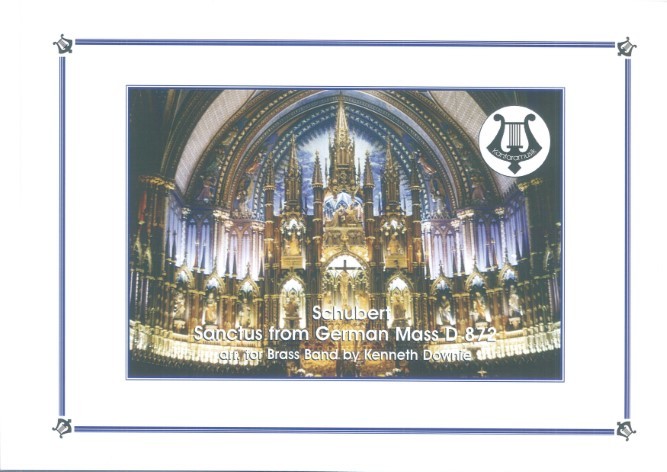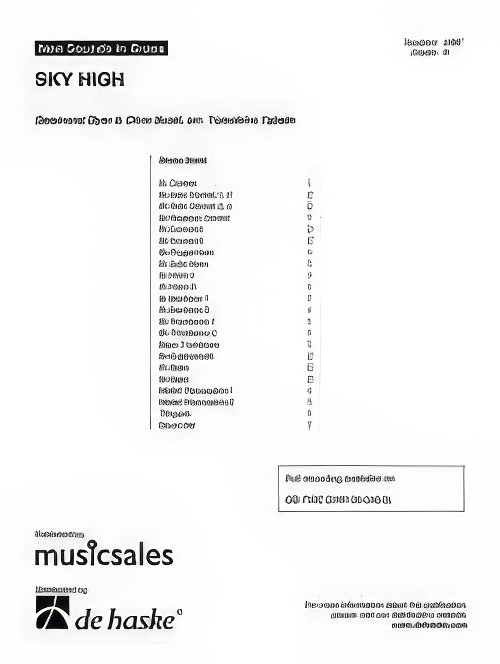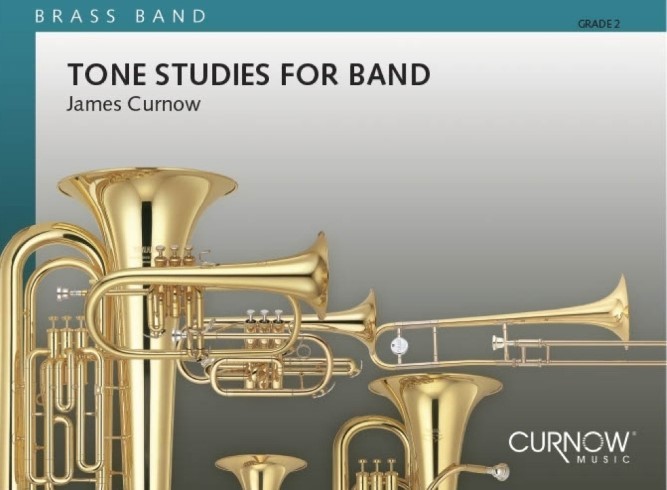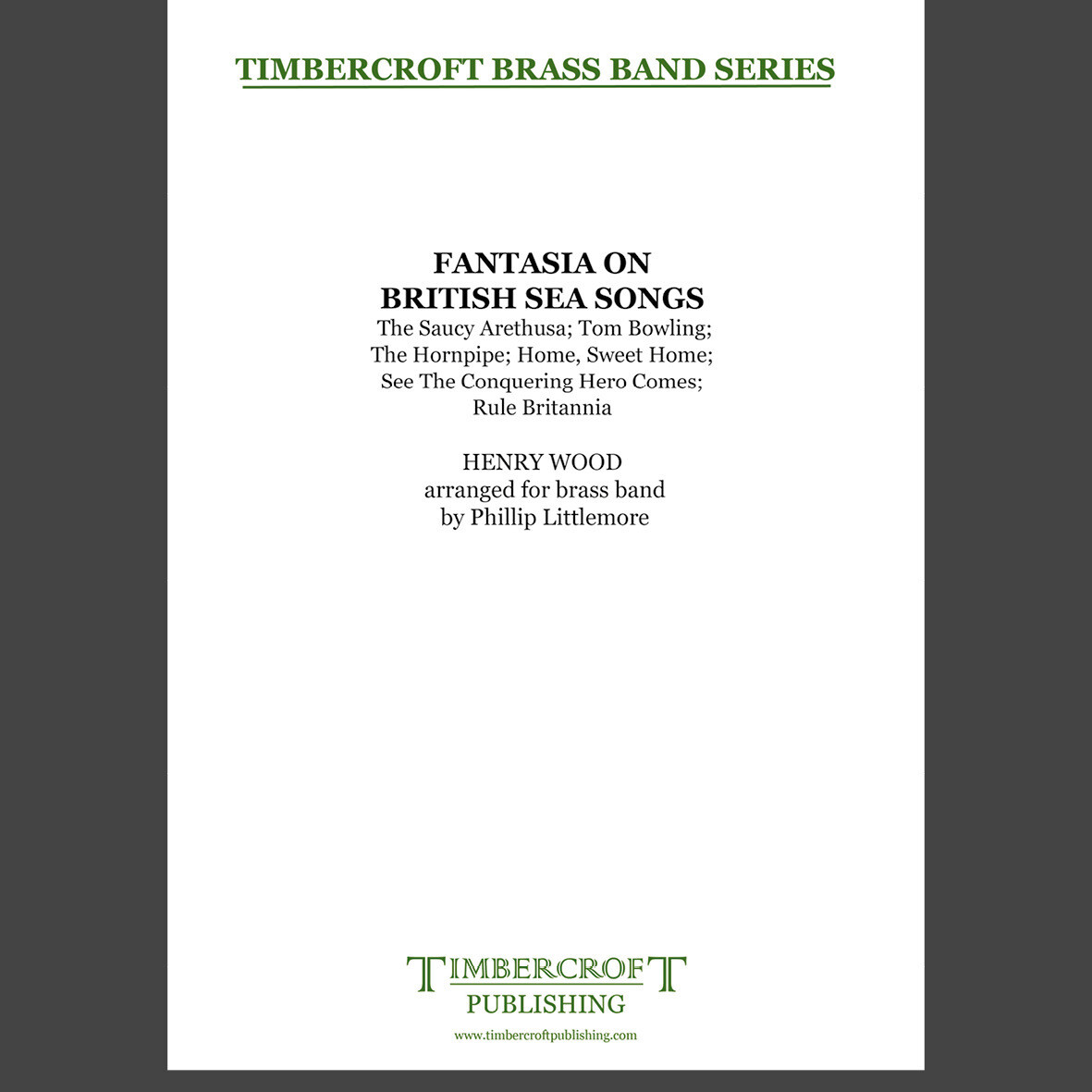Results
-
 £19.95
£19.95Sanctus (From German Mass D.872) (Brass Band - Score and Parts) - Schubert, Franz - Downie, Kenneth
Franz Schubert's so-called German Mass, D. 872 is one of his last works of sacred music and was written in 1827. The work was commissioned by Professor J P Neumann of the Polytechnic School of Vienna who provided the texts for the nine short sections. It was Neumann's idea that the work be as musically simple as possible and able to be performed by amateurs. This arrangement of the Sanctus seeks to preserve the simplicity of the original, allowing the sheer beauty of the melodic lines to have prominence.
Estimated dispatch 7-14 working days
-
 £9.95
£9.95Sanctus (From German Mass D.872) (Brass Band - Score Only) - Schubert, Franz - Downie, Kenneth
Franz Schubert's so-called German Mass, D. 872 is one of his last works of sacred music and was written in 1827. The work was commissioned by Professor J P Neumann of the Polytechnic School of Vienna who provided the texts for the nine short sections. It was Neumann's idea that the work be as musically simple as possible and able to be performed by amateurs. This arrangement of the Sanctus seeks to preserve the simplicity of the original, allowing the sheer beauty of the melodic lines to have prominence.
Estimated dispatch 7-14 working days
-
 £72.99
£72.99Sky High (Brass Band - Score and Parts) - Dyer, Desmond - Tabete, Tomohiro
In 1966, the British singer-songwriters Des Dyer and Clive Scott founded the pop group Jigsaw. Nine years later they enjoyed their first great success with the catchy song Sky High which rode high in the charts in many countries throughout the world. The Japanese arranger Tomohiro Tabete has composed this exciting version for brass band.Duration: 4:00.
Estimated dispatch 7-14 working days
-
 £82.95
£82.95Tallis Variations (Brass Band - Score and Parts) - Sparke, Philip
The hymn tune on which these variations are based is the third of nine that Thomas Tallis wrote in 1567 as part of a psalter for the first Anglican Archbishop of Canterbury, Matthew Parker. It was later used by Vaughan Williams in the English Hymnal and as the basis for his Fantasia.Duration: 15:09Recorded on Polyphonic QPRL232D Sea Pictures
Estimated dispatch 7-14 working days
-
 £64.99
£64.99Tone Studies for Band (Brass Band - Score and Parts) - Curnow, James
Tone Studies for brass band consists of nine studies designed to aid the development of good individual and ensemble tone production and intonation. Add Tone Studies to your library and you will find it quickly becomes an indispensable part of your band's rehearsal routine.
Estimated dispatch 7-14 working days
-
 £38.00
£38.00SYMPHONY No.2, Finale from (Brass Band) - Mahler, Gustav - Harper, Philip
One of the most life-affirming pieces of music ever composed, Mahler's 2nd Symphony, subtitled "The Resurrection", was first performed in Berlin in 1895. Mahlers interest in the mysteries of the afterlife is well-known and is a recurring theme throughout all his nine symphonies. Philip Harper has arranged the final passages of the 2nd Symphony, which begins with a profound hymn set to the words of Friedrich Klopstock-- Rise again, yea, thou shalt rise again. The music contains one of Mahler's magical transitionary passages, building in intensity, before the hymn is restated in all its majesty at the moment of glorious resurrection. This arrangement was performed as the finale to Cory Band's winning Brass in Concert programme in 2012. The publisher of this works suggests that it should be playable by 1st. section bands upwards.
Estimated dispatch 7-14 working days
-
 £44.95
£44.95Tallis Variations (Brass Band - Score only) - Sparke, Philip
The hymn tune on which these variations are based is the third of nine that Thomas Tallis wrote in 1567 as part of a psalter for the first Anglican Archbishop of Canterbury, Matthew Parker. It was later used by Vaughan Williams in the English Hymnal and as the basis for his Fantasia.Duration: 15:09Recorded on Polyphonic QPRL232D Sea Pictures
Estimated dispatch 7-14 working days
-
 £40.00
£40.00Fantasia on British Sea Songs - Henry Wood arr. Phillip Littlemore
Henry Wood's medley Fantasia on British Sea Songs was arranged in 1905 to mark the centenary of the Battle of Trafalgar. For many years it was as an indispensable item at the BBC's Last Night of the Proms concert.Wood's arrangement comprised nine parts, although this transcription has been somewhat truncated to make it more manageable for a brass band concert. The movements selected are The Saucy Arethusa; Tom Bowling; Jack's The Lad (The Hornpipe); Home; Sweet Home; See The Conquering Hero Comes; Rule Britannia. Duration: 5'00"Difficulty: Suitable for all
Estimated dispatch 5-7 working days
-
Covent Garden - Len Jenkins - Len Jenkins
Cast your mind back to the Covent Garden of Eliza Doolittle and the activity of the dealers, porters, costermongers, and other staff around the market. In cinematographic terms the ideal setting for a set-piece dance routine to reflect the hustle and bustle of trade in the early morning. The market may have moved to Nine Elms, but the activity is still just as vibrant, so we called this piece Covent Garden to reflect the activity which we rarely see, but know exists, in a busy commercial flower, vegetable and food market. The music has a good strong theme which carries the activities, numerous and varied, not always without hindrance but always coming good at the end so that we have food on our plates, flowers to enjoy and a tradition preserved.
-
£60.00
Fantasy Overture Swan Lake - Tchaikovsky, P - Harper, P
Philip Harper's new version of highlights from this cherished Russian ballet classic, including the Dance with Goblets, Scene by the Lake, Waltz of the Swans and many of the heart-racing up tempo dances, as heard played by Cory Band on Classic FM. Nine minutes of pure escapism, suitable for 1st Section bands or above.1st section +Duration 9 mins Listen here - Courtesy of Cory Band
In Stock: Estimated dispatch 1-3 working days
